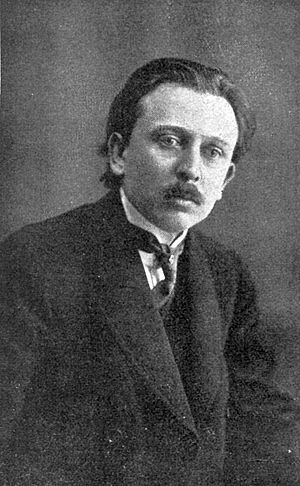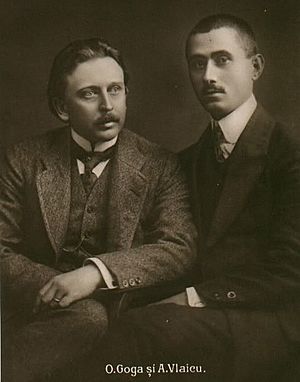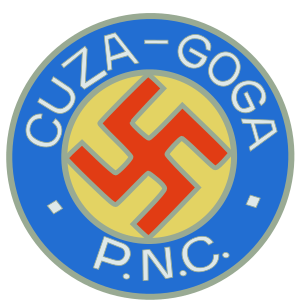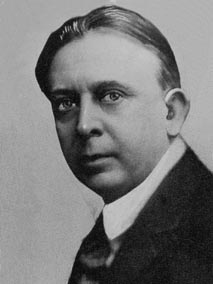Octavian Goga facts for kids
Quick facts for kids
Octavian Goga
|
|
|---|---|
 |
|
| 37th Prime Minister of Romania | |
| In office 28 December 1937 – 10 February 1938 |
|
| Monarch | Carol II |
| Preceded by | Gheorghe Tătărescu |
| Succeeded by | Miron Cristea |
| Minister of the Interior | |
| In office 30 March 1926 – 4 June 1927 |
|
| Prime Minister | Alexandru Averescu |
| Preceded by | Ion I. C. Brătianu |
| Succeeded by | Barbu Știrbey (interim) |
| Minister of Culture and Religious Affairs | |
| In office 5 December 1919 – 16 December 1919 |
|
| Prime Minister | Alexandru Vaida-Voevod |
| Preceded by | Alexandru Lupescu |
| Succeeded by | Ion Borcea |
| In office 13 June 1920 – 16 December 1921 |
|
| Prime Minister | Alexandru Averescu |
| Preceded by | Ion Borcea |
| Succeeded by | Vasile Dumitrescu-Brăila |
| Co-Leader of the National Christian Party | |
| In office 16 July 1935 – 10 February 1938 Serving with A. C. Cuza & Nichifor Crainic
|
|
| Preceded by | Himself (as president of the National Agrarian Party) A. C. Cuza (as president of the National-Christian Defense League) |
| Succeeded by | None (party banned under the 1938 Constitution) |
| Founding President of the National Agrarian Party | |
| In office 10 April 1932 – 16 July 1935 |
|
| Succeeded by | Himself (party merged into the National Christian Party) |
| Personal details | |
| Born | April 1, 1881 Rășinari, Sibiu County, Romania |
| Died | May 7, 1938 (aged 57) Ciucea, Cluj County, Kingdom of Romania |
| Political party | Romanian National Party (before 1918) People's Party (1918-1932) National Agrarian Party (1932-1935) National Christian Party (1935-1938) |
| Spouses |
Hortensia Goga (b. Cosma)
(m. 1906–1920)Veturia Goga (b. Mureșan)
(m. 1921–1938) |
| Profession | poet, journalist |
| Signature |  |
Octavian Goga (born April 1, 1881 – died May 7, 1938) was a Romanian politician, poet, writer, journalist, and translator. He was known for his strong nationalistic views.
Contents
Early Life and Political Beginnings
- Further information: Kingdom of Romania under Fascism
Octavian Goga was born in Rășinari, a town close to Sibiu in Romania.

Goga was an active member of the Romanian national movement in Transylvania. This region was part of Austria-Hungary at the time. He belonged to the Romanian National Party (PNR). Before World War I, Hungarian authorities arrested Goga because of his political actions. He often sought safety in Romania, where he became involved in writing and politics. Because of his work in Romania, the Hungarian government sentenced him to death while he was not there.
During World War I, Goga joined the Romanian Army. He served as a soldier in the Dobruja campaign.
Joining and Forming Political Parties
In 1926, Octavian Goga, along with Vasile Goldiș, Ioan Lupaș, and Silviu Dragomir, left the PNR. They joined General Alexandru Averescu's People's Party (PP). This party was a popular movement that started after the war.
Goga later disagreed with Averescu over his conflicts with King Carol II. So, on April 10, 1932, Goga and his friends founded the National Agrarian Party. This party then joined with A. C. Cuza's National-Christian Defense League. Together, they formed the National Christian Party on July 14, 1935.
Time as Prime Minister
In December 1937, the National Liberal Party lost the elections. Even though Goga's National Christian Party only got about 9% of the votes, King Carol II chose him to be the Prime Minister of Romania. The King hoped this government would be a short-term solution. He wanted to change the political system afterward.
However, the King did not fully predict the problems Goga's government would cause. Goga's cabinet introduced rules that were unfair to some groups of people. These actions aimed to gain support from other political groups. But they ended up harming Romania's economy and its relationships with countries like France and Great Britain. They also made other political groups stronger, which the King did not want.
The National Christian Party had a group called the Lănceri (meaning "Lancers"). This group sometimes caused trouble by attacking people.
King Carol II eventually decided to remove Goga from power. He worked with his Minister of the Interior, Armand Călinescu, to plan this. The King's plan sped up when Goga tried to make a deal with another political leader, Corneliu Zelea Codreanu. This deal could have made Goga too powerful.
On February 10, 1938, King Carol II met with Goga. He asked Goga to delay new elections, and Goga resigned. Goga did not join the new government the King formed. He went back to his home in Ciucea, Transylvania. He suffered a stroke on May 5, 1938, and passed away two days later, on May 7, 1938.
Famous Sayings
Octavian Goga made some notable statements during interviews:
The Jewish problem is an old one here, and it is a Romanian tragedy. Briefly, we have far too many Jews.
For us there is only one final solution of the Jewish problem—the collection of all Jews into a region that is still uninhabited, and the foundation there of a Jewish nation. And the further away the better.
Writings and Works
Poetry Collections
- Cărbunii ("The Pieces of Coal")
- Rugăciune ("A Prayer")
- Plugarii ("The Ploughmen")
- Oltul ("The Olt River")
- Din larg ("From the High Seas")
- Profetul ("The Prophet")
- Ceahlăul ("The Ceahlău")
- O ramură întârziată ("A Tardy Branch")
- Trecutul ("The Past")
- Apus ("Sunset")
- Mare eternă ("The Eternal Sea")
- În mine câteodată ("At Times within Me")
- Toamna(Autumn)
Plays Written
- Domnul notar ("Mr. Notary")
- Meşterul Manole (see Meşterul Manole)
See also
 In Spanish: Octavian Goga para niños
In Spanish: Octavian Goga para niños
 | Leon Lynch |
 | Milton P. Webster |
 | Ferdinand Smith |



